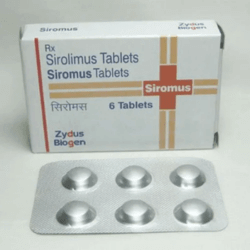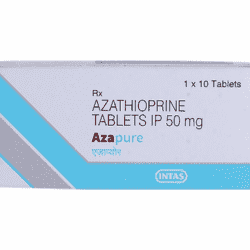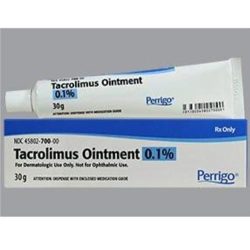Description
What is Sirolimus and what it is use for:
Sirolimus is an immunosuppressive agent which is used to prevent organ transplant rejection and treat a rare lung disease called lymphangioleiomyomatosis sirolimus has immunosuppressant functions and is especially effective in order to prevent the rejection of the kidney transplants.
Dosage: Rapamune should be administered orally once daily, consistently either with or without the food. Avoid the consumption of such tablets which are crushed, chewed or splits. Patients who are not able to consume the tablets should be prescribed for the solution. Initial dose of the sirolimus tablets should be administered immediately after the transplantation. It is recommended that this drug should be taken 4 hours after the administration of the cyclosporine oral solution or cyclosporine capsules.
Treatment Reactions: The most commonly reported sirolimus side effects are as follows:
- peripheral edema
- hypertriglyceridemia
- hypertension
- hypercholesterolemia
- creatinine increased
- constipation
- abdominal pain
- diarrhea
- headache
- fever
- urinary tract infection
- anemia
- nausea
- arthralgia
- pain
- thrombocytopenia
Warning & Precautions
- Any patient who is administered Rapamycin must be monitored for hyperlipidemia.
- Renal function should be precisely monitored during the co-administration of the sirolimus with the cyclosporine.
- Care should always be exercised when administering agents such as aminoglycosides and amphotericin B that are known to have a deleterious effect on the renal function.
- During treatment with sirolimus 1 mg, use of live vaccines should be avoided.
- The use of the siromus 1 mg should be avoided during pregnancy.
- General supportive measures must be followed in all the cases of drug overdose.
- In missed dose circumstances, immediately report to your healthcare provider in order to get appropriate medical help.
The Indian Pharma connects buyer with the supplier who can ship Sirolimus Tablets to Bulgaria, Belgium, Hongkong, middle east, Africa, Latin America, Asiaeast Asia, Europe and any country of the world as per the buyer’s requirement and Government regulations of the country. Sirolimus Tablets is manufactured by Zydus.



